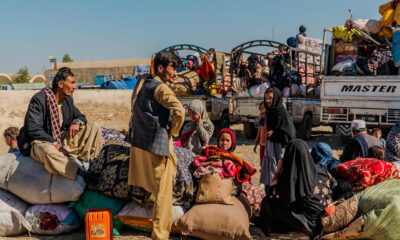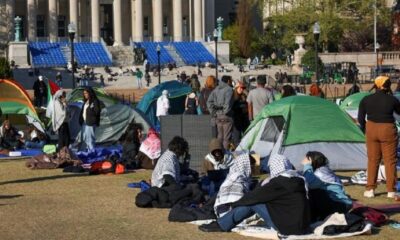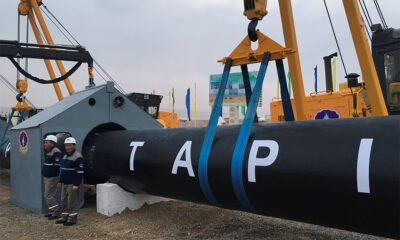Regional
At least 15 killed and 50 injured as train derails in Pakistan

At least 15 people have been killed and dozens injured after a train derailed in south-east Pakistan while on it’s way from Karachi to Rawalpindi on Sunday.
Railways Divisional Superintendent Sukkur Mahmoodur Rahman told local media that 10 train carriages were derailed in the crash, which happened in Nawabshah.
The death toll is feared to rise as the train is said to have carried a large number of passengers, Pakistan’s Geo TV reported.
A rescue operation is currently underway, officials told Radio Pakistan.
Ijaz Shah, a provincial railway official, told AFP that several passengers were killed and several others injured in the accident, and that a relief train has been dispatched to the site.
Images posted to local media show dozens of people at the site, with some smashing windows to help passengers clamber out of the twisted carriages and at least one coach overturned.
Rail accidents are not uncommon in Pakistan.
More than 60 people were killed in a train crash in 2021, when a train derailed and was later hit by another oncoming express service. Also, several people were wounded in January, when a bomb blast derailed a train in Balochistan province.
Regional
Iraq criminalises same-sex relationships with maximum 15 years in prison

Iraq’s parliament passed a law criminalising same-sex relationships with a maximum 15-year prison sentence on Saturday, in a move it said aimed to uphold religious values but was condemned by rights advocates as the latest attack on the LGBT community in Iraq.
The law aims to “protect Iraqi society from moral depravity and the calls for homosexuality that have overtaken the world,” Reuters reported citing a copy of the law.
It was backed mainly by conservative Shi’ite Muslim parties who form the largest coalition in mainly Muslim Iraq’s parliament.
The Law on Combating Prostitution and Homosexuality bans same-sex relations with at least 10 years and a maximum of 15 years in prison, and mandates at least seven years in prison for anybody who promotes homosexuality or prostitution.
It also imposes between one and three years in prison for anyone who changes their “biological gender” or wilfully dresses in an effeminate manner.
The bill had initially included the death penalty for same-sex acts but was amended before being passed after strong opposition from the United States and European nations.
Until Saturday, Iraq didn’t explicitly criminalise gay sex, though loosely defined morality clauses in its penal code had been used to target LGBT people, and members of the community have also been killed by armed groups and individuals.
“The Iraqi parliament’s passage of the anti-LGBT law rubber-stamps Iraq’s appalling record of rights violations against LGBT people and is a serious blow to fundamental human rights,” Rasha Younes, deputy director of the LGBT rights programme at Human Rights Watch, told Reuters.
Iraqi officials who oversee human rights could not immediately be reached for comment.
Major Iraqi parties have in the past year stepped up criticism of LGBT rights, with rainbow flags frequently being burned in protests by both ruling and opposition conservative Shi’ite Muslim factions last year.
More than 60 countries criminalise gay sex, while same-sex sexual acts are legal in more than 130 countries, according to Our World in Data.
Regional
China to host Hamas, Fatah for Palestinian unity talks

China will host Palestinian unity talks between Hamas and its rivals Fatah, the two groups and a Beijing-based diplomat said on Friday, a notable Chinese foray into Palestinian diplomacy amid the war in the Gaza Strip.
Hamas, which controls Gaza, is the group whose fighters stormed into Israeli towns on Oct. 7, killing 1,200 people and capturing 253 hostages. Israel has sworn to annihilate Hamas in an onslaught that has killed more than 34,000 Palestinians.
Fatah is the movement of Mahmoud Abbas, president of the Western-backed Palestinian Authority, which exercises limited self-rule in the Israeli occupied West Bank.
The two rival Palestinian factions have failed to heal their political disputes since Hamas fighters expelled Fatah from Gaza in a short war in 2007. Washington is wary of moves to reconcile the two groups, as it supports the PA but has banned Hamas as terrorists.
A Fatah official told Reuters a delegation, led by the group’s senior official Azzam Al-Ahmed, had left for China. A Hamas official said the faction’s team for the talks, led by senior Hamas official Moussa Abu Marzouk, would be flying there later on Friday.
“We support strengthening the authority of the Palestinian National Authority, and support all Palestinian factions in achieving reconciliation and increasing solidarity through dialogue and consultation,” said Chinese Foreign Ministry spokesperson Wang Wenbin at a regular briefing on Friday, without confirming the meeting.
The visit will be the first time a Hamas delegation is publicly known to have gone to China since the start of the war in Gaza. A Chinese diplomat, Wang Kejian, met Hamas chief Ismail Haniyeh in Qatar last month, according to the Chinese foreign ministry.
The Beijing-based diplomat, who had been briefed on the matter, said the talks aimed to support efforts to reconcile the two Palestinian rival groups.
China has lately demonstrated growing diplomatic influence in the Middle East, where it enjoys strong ties with Arab nations and Iran. Last year, Beijing brokered a breakthrough peace deal between longstanding regional foes Saudi Arabia and Iran.
U.S. Secretary of State Antony Blinken said he discussed with Chinese President Xi Jinping and other officials in Beijing on Friday how China can play a constructive role in global crises, including the Middle East.
Chinese officials have ramped up advocacy for the Palestinians in international forums in recent months, calling for a larger-scale Israeli-Palestinian peace conference and a specific timetable to implement a two-state solution.
In February, Beijing urged the International Court of Justice (ICJ) to give its opinion on the Israeli occupation of the Palestinian Territories, which it said was illegal.
More recently, China has been pushing for Palestine to join the United Nations, which Beijing’s top diplomat Wang Yi said last week would “rectify a prolonged historical injustice”.
(Reuters)
Regional
New UK sanctions target Iranian drone industry

Britain on Thursday announced new sanctions targeting Iran’s military drone industry, in response to Iran’s drone and missile attack on Israel earlier this month.
The measures, taken in co-ordination with the U.S. and Canada, target four businesses and two directors at a network of drone companies with the aim of limiting Iran’s ability to launch drones.
“The Iranian regime’s dangerous attack on Israel risked thousands of civilian casualties and wider escalation in the region,” British Foreign Secretary David Cameron said in a statement.
“Today the UK and our partners have sent a clear message – we will hold those responsible for Iran’s destabilising behaviour to account.”
Britain also said it would introduce new bans on the export of drone and missile components to Iran, seeking to limit its military capabilities.
Last week, Britain imposed sanctions on Iranian military figures and organisations, in another coordinated move with the United States, following Iran’s action against Israel.
Iran launched drones and fired missiles at Israel on April 13 as a retaliatory strike for the attack on its embassy compound in Damascus two weeks prior, raising the risk of further escalation in conflict in the Middle East.
(Reuters)
-

 World4 days ago
World4 days agoNorth Korea officials visit Iran in a rare public trip
-

 Sport4 days ago
Sport4 days ago‘Serious talent’ Fraser-McGurk bonds with Warner to light up IPL
-

 Latest News4 days ago
Latest News4 days agoOver 1,000 Afghan refugees forced out of Pakistan in one day
-

 Regional2 days ago
Regional2 days agoNew UK sanctions target Iranian drone industry
-

 Sport2 days ago
Sport2 days agoAfghanistan beat Iraq 5-3, inch closer to Futsal World Cup berth
-

 Regional3 days ago
Regional3 days agoTurkey accuses U.S. of double standards over Gaza in rights report
-

 Latest News2 days ago
Latest News2 days agoEU allocates 17 million euros to support Afghans on the move
-

 Latest News1 day ago
Latest News1 day agoPakistan extends registered Afghan refugees’ stay till June 30
























